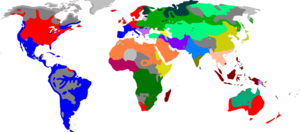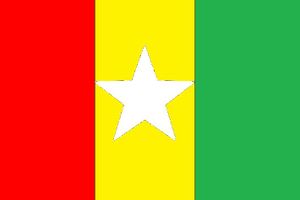Guosa
| Guosa | |
|---|---|
| ߜ߭ߎߏߛߊ | |
 | |
| Writing | w:N'Ko alphabet |
| Region: | w:West Africa |
| Genders: | 0 |
| Cases: | 0 |
| Alignment | Nominative-Accusative |
| Proto-language: | Niger–Congo languages |
| Typology: | Analytic |
| Word-Order | SVO |
| Languages: | Hausa language, |
| Population: | 340 million |
 | |
|
Africa: SEDES • Middle Semitic • Kintu • Guosa Central Asia: Jalpi • Caucas • Zens • Dravindian • Neo-Sanskrit Europe: Intralingua • Folksprak • Interslavic • Balkan • Samboka Far East: Dan'a'yo • IM • MSEAL | |
Invented by Alex Igbineweka
http://www.guosa-language-tv.com/
Orthography
Morphophonology
| Singular | Plural | ||
|---|---|---|---|
| 1st | Nom. | mó - ߡߏ߫ - I | a - ߊ - we |
| Obl. | mí - ߡߌ߫ - me/my | wá - ߥߊ߫ - our | |
| 2nd | Nom. | ɔ́ - ߐ߫ - you | ɛ - ߍ |
| Obl. | ɛ́ - ߍ߫ - your | yín - ߦߌ߫ߒ - your | |
| 3rd | Nom. | ó - ߋ߫ - he/she | wɔ/n - ߥߐ߫ߒ |
| Obl. | ya - ߦߊ | wɔn - ߥߐߒ |
Evolution:
In the Guosa Language, visible and concrete objects are of Hausa, and or other northern Nigerian languages vocabularies origin; example:
Guosa ~English
Kwàndó~basket Kázá ~hen Ból ~ball Líttáfí ~book Fénsà ~pencil
Invisible or abstract things are of Igbo, Yoruba or other southern Nigeria language origin. Their evolution from either Igbo and or Yoruba depends mainly on the alphabetical sequences. For instance, let us take the word “come” in English which meant: bìa (in Igbo language); and a corresponding wá (in Yoruba language) respectively. To decide which word should come in first or which word should evolve into the Guosa, you go on alphabetical sequence. In the above words from Igbo and yoruba languages, you will see that bìa comes before wá alphabetically.
Therefore, a sentence like: please, give me water (English) is thus evolved and translated as: bíko, fún mi ní rúwá (in the Guosa Language) because water is rúwá; and fún mi ní refers to give me.
Verb Patterns:
Guosa ~English
ò chètó ájì ‘wá tí shìengá gídá~ our class Monitor has gone home ó tí shìhé kófà? ~Have you opened the door? báasì, mó tí shìhé kófà ~yes, I have opened the door.
Present Progressive:
mó ng sòngí ‘sóngà ~I am singing a song abókí mí ng sámbà ~my friend is dancing àwá ng mùkó èdè Gúosà ~we are learning Guosa Language kázá mí ng mùbí kwái ~my hen is laying eggs.
Past Progressive:
árdún gómà fífèjá, mó húsí nà Saot Afrika~ten years ago, I was living in Belgium Kádíri bìawá hún mí làyén~ Kadiri came to see me yesterday. mó tí yámá mótà zúum-zúum ~I have bought a motor-car èyí wù wàsíkà tí Engineer Wàkómbì tí kòdé sí mí~This is the letter which Engineer Wakombo has written to me. Bamidele yìí fénsà tí Àdágbà nòn mí nà úzòlá fífèjá.....~Bamidele has taken the pencil which Adagba gave me last week..
mótà mí tí mèjé ~my motor has broken down mà ~know ìmà~ knowing, knowingly mî mà ~I do not know
mó mà ~I know mó tí mà ~I have known ó tí mà ~you have known
Lexicography
- see also Guosa/Swadesh
In the Guosa language, visible and concrete objects are of Hausa, and or other northern Nigerian languages origin.
- àbíncí - ߊ߬ߓߌ߫ߒߗߌ߫ - food /a.bi.n.ci/
- gbóntì - ߜߏ߫ߒߕߌ߬ - to hear, to listen
- íkpikpi - ߌ߫ߜ߳ߌߜ߳ߌ - bacteria
- kwàndó - ߞ؛ߥߊ߬ߒߘߏ߫ - basket ... y?w?
- kázá - ߞߊ߫ߛ߭ߊ߫ - hen ... z?!?
- lítáfí - ߟߌ߫ߕߊ߫ߝߌ߫ - book
- fénsà - ߝߋ߫ߒߛߊ߬ - pencil /fe.n.sa/
- bíko - ߓߌ߫ߞߏ - please
- rúwá - ߙߎ߫ߥߊ߫ - water (no glottal stop before w)
- kófà - ߞߏ߫ߝߊ߬ - door
- báasì - ߓߊ߯ߛߌ߬ - yes
- mó - ߡߏ߫ - I
- mí - ߡߌ߫ - me (oblique), postposition my
- ó - ߏ߫ - third person singular personal pronoun
- shìhé - ߛ߭ߌ߬ߤߋ߫ - to open ...sh?
- ng - ߢ߭ - present progressive marker
- bìa - ߓߌ߫ߊ - to come
- tí - ߕߌ߫ - perfective marker, relative clause particle
- la - ߟߊ - simple past tense marker
- jìndé - ߖߌ߬ߒߘߋ߫ - to arise
- è - ߋ߬ - pluralizing prefix
